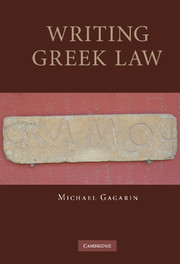Book contents
- Frontmatter
- Contents
- List of illustrations
- Preface and Acknowledgments
- List of abbreviations
- Introduction: Writing Greek Law
- Chapter 1 Law before Writing
- Chapter 2 Writing and Written Laws
- Chapter 3 Why the Greeks Wrote Laws
- Chapter 4 Why Draco Wrote his Homicide Law
- Chapter 5 Oral and Written in Archaic Greek Law
- Chapter 6 Writing Laws in Fifth-Century Gortyn
- Chapter 7 Writing the Gortyn Code
- Chapter 8 Writing Law in Classical Athens
- Chapter 9 Writing Athenian Law: a Comparative Perspective
- Chapter 10 Writing Law in Hellenistic Greece
- Conclusion: Writing Greek Law
- Appendices
- Bibliography
- Index Locorum
- Subject Index
Chapter 1 - Law before Writing
Published online by Cambridge University Press: 22 September 2009
- Frontmatter
- Contents
- List of illustrations
- Preface and Acknowledgments
- List of abbreviations
- Introduction: Writing Greek Law
- Chapter 1 Law before Writing
- Chapter 2 Writing and Written Laws
- Chapter 3 Why the Greeks Wrote Laws
- Chapter 4 Why Draco Wrote his Homicide Law
- Chapter 5 Oral and Written in Archaic Greek Law
- Chapter 6 Writing Laws in Fifth-Century Gortyn
- Chapter 7 Writing the Gortyn Code
- Chapter 8 Writing Law in Classical Athens
- Chapter 9 Writing Athenian Law: a Comparative Perspective
- Chapter 10 Writing Law in Hellenistic Greece
- Conclusion: Writing Greek Law
- Appendices
- Bibliography
- Index Locorum
- Subject Index
Summary
The earliest period of Greek law for which we have evidence, albeit indirect, is the era portrayed in the poems of Homer and Hesiod, which we may loosely refer to as the period of “Homeric society.” Although the events in Homer take place at the end of the Bronze Age (ca. 1200–1150), the institutions portrayed almost certainly represent those of a later period, most likely the eighth century, shortly before these poems were put in writing, probably around 700. Moreover, the works of both Homer and Hesiod contain episodes and allusions pertaining to judicial matters on the basis of which we can sketch a picture of a more or less formal process for judging or settling disputes between members of the community. Certain details of this process may vary, but there is enough consistency among the different episodes to conclude that early Greek legal procedure was a recognizable institution with well-established parameters within which there was room for variation in detail. Like the rest of the Homeric/Hesiodic world, the legal process shows no knowledge of writing, even though writing was probably introduced to the Greek world a century or so before these poems were written down. Thus, we are justified in assuming that legal procedures such as those portrayed in the poems existed in Greece in the eighth or ninth centuries and probably continued with little change (and without the use of writing) until the mid seventh century, when laws first began to be written.
- Type
- Chapter
- Information
- Writing Greek Law , pp. 13 - 38Publisher: Cambridge University PressPrint publication year: 2008

